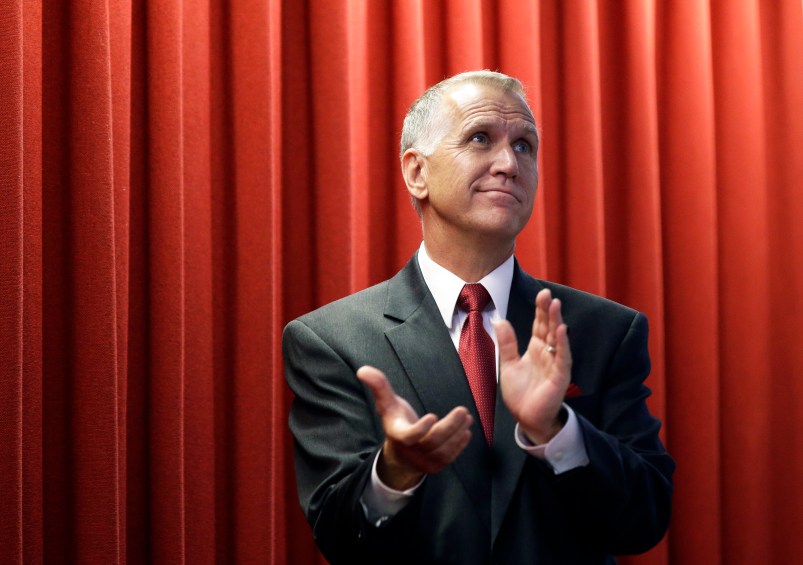State House Speaker Thom Tillis (R-NC), the Republican nominee for U.S. Senate in North Carolina, said that the “traditional” voting bloc of his home state wasn’t growing like minority populations in an interview he did in 2012.
In that interview with the Carolina Business Review, Tillis, who is running to defeat incumbent Sen. Kay Hagan (D-NC), was asked what he thought of Hispanics not supporting Republicans.
“When you see all of these things that have transpired, what do you think about?” Carolina Business Review host Chris William asked Tillis.
In response, Tillis said that the answer had more to do with “demographics of the country.”
“If you take a look, you mentioned the Hispanic population — the African American population, there’s a number of things that our party stands for that they embrace,” Tillis said. He went on to say that Republican need to do a better job reaching out to minority voters. Tillis then said that unlike the Hispanic or black populations, which have been growing, the “traditional population of North Carolina and the United States is more or less stable.”
According to 2000 census numbers, the percentage of people who identified as “white alone” in North Carolina was 72.11 percent. By contrast, according 2010 census numbers, the percentage of people who identified as “white alone” was 68.47 percent. In 2010 the percentage of blacks in North Carolina was 21.48 percent while in 2000 the percentage was 21.59 percent. The 2000 census said that 4.71 percent of the population was “Hispanic or of Latino origin.” In 2010 that percentage was 8.39 percent.
Tillis was referring to North Carolinians who have been in the state for a few generations, according to the state lawmaker’s campaign.
“”Traditional” North Carolinians refers to North Carolinians who have been here for a few generations,” Tillis campaign Communications Director Daniel Keylin told TPM. “A lot of the state’s recent population growth is from people who move from other states to live, work, and settle down in North Carolina. Thom Tillis for example.”
Here’s the exchange between the host and Tillis:
William: Let’s start fairly broad with the Republican Party. You watch— and probably see many more— polls than I do or we do in general. When you watch what’s happening in presidential politics. When you see this shift that Hispanics used to be in the Republican Party and now they’re clearly on the other side of the aisle —when you see all of these things that have transpired, what do you think about? what is going on in the Republican Party?
Tillis: Well I think it has more to do what’s going on in the demographics of this country and recognizing that and then having a platform and a message that resonates. If you take a look, you mentioned the Hispanic population —the African American population, there’s a number of things that our party stands for that they embrace. I think we have to do a better job of communicating it. I think we have to do a better job of being out there in between elections, garnering support for the things that we’re trying to advance. And I think that we need a focus on limited government and free markets which is something that’s appealing to everybody. That kind of work will position us for those growing sectors. The traditional population of North Carolina and the United States is more or less stable. It’s not growing. The African American population is roughly growing but the Hispanic population and the other immigrant populations are growing in significant numbers. We’ve got to resonate with those future voters.
Watch below. The exchange starts at about the 2:45 mark:







It sure doesn’t sound to me like he was talking about people born in N.C. Sounds more like minorities versus whites.
Tillis was referring to North Carolinians who have been in the state for a few generations, according to the state lawmaker’s campaign.
Sure he was… right. (wink wink)
It sounds like the idea of relying on an aging population of White, ignorant, racist cretins as the base support for an anachronistic political ideology bred in the 17th century, isn’t going to be the salvation for the increasingly fractured Conservative agenda.
No doubt, he was referring to the Catawba and Cherokee nations.
He specifically referred to “the traditional population of NC and the United States.” There’s no way to spin it to mean some group of people in NC alone.